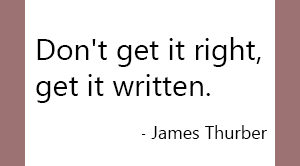The Writing Process: Get Sh*t Done
You know what they say about excuses? They fucking suck. Yet we still use them.
Maybe we’re guilt-driven, time-exhausted dreamers who – as much as we don’t want to admit it – put everything outside of our writing careers first. Who has time to sit down and write when the house hasn’t been vacuumed in a week?
You. If you’re taking your craft seriously, that is.
Or maybe other issues prevent you from committing.
“I’m so emotionally drained I can’t tap into the feelings I need to write this.”
“I only write when the mood strikes. I haven’t felt it in a few days.”
“After working all day, I feel guilty taking time away from the kids.”
“I work 60 hours a week to pay the mortgage, fuck it all if you think I can handle anything else right now.”
Sound familiar?
Everyone has a reason to put down the pen. Trust me. I never imagined I would add ‘counselor’ to my workload, but I’m here and doing it.
Excuses don’t matter. You’re not the exception to the rule, so let’s cut the crap.
Schedules are required
If you want your writing to get better, you need to set aside writing time every day.
We don’t like saying ‘no’ to anyone, especially not our boss, kids or spouse. It’s a problem though, because overbooking yourself leaves zero time to write. If you schedule a regular time to write each day, you’re dedicating yourself to getting better, further – and getting the hell out of the bad habit of telling everyone yes all the time.
Plus, an hour during lunch or thirty minutes before bed for writing helps prevent writing burnout. Force yourself to quit after time’s up (ask me about the sweet spot), so you come back excited to begin again. If you’re outside of your allotted writing time, jot down lingering ideas in your journal or notebook. You’ll have plenty of ideas to come back to on days when writing a sentence feels impossible.
It isn’t easy
Every day is not a great writing day. In fact, I think every first draft is shit. So why are we especially hard on ourselves when words stick?
Lower your standards. Perfectionism is ugly and unattainable – it’s also divine self-sabotage. Stop it. It sets up a nasty combination of inadequacy and editing ourselves before we write a single word.
Instead, realize writing and editing are two different processes coming from two different parts of your brain. Tell your story like you’re talking to a friend. Once the entire piece is done, you’ll shine it up, but until then it doesn’t do you any good to over-analyze.
If your creativity is stupefied, play with words. Write about what’s stopping you in the moment. Write out the frustration, damn it. Your day’s writing might not be a part of a bigger project. So what? You’re still writing. Fight the urge to give up.
If you’re pissed a certain character is talking to you out of turn, follow him anyway.
The most important quality a writer can have is comfort in their own skin. This takes confidence. And confidence comes from practice. Writing regularly gives you both.
***
Want tolearn more about writing like YOU? I’m polishing a new product that will teach you exactly that. Join our subscriber list (upper right-hand corner) to hear more about it and get a discount when it’s released. I’ll also let you know when the *new* cell phone app is available.




